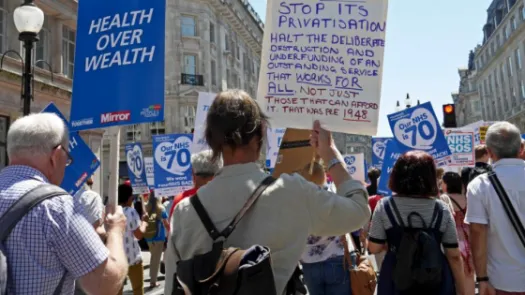Stage 2 - Maintaining social benefits: under surveillance and control

Picture: Antti T. Nissinen, CC BY 2.0
In addition to the issues we highlighted in stage 1, where intrusive personal information is required in order to apply for social benefits, recipients who seek to maintain their social benefits are required to regularly disclose similar information and are also subjected to the numerous forms of surveillance described above.
1. Social benefits systems use monitoring to exert control over recipients. These systems are imbued with the coercive power and authority of the state—which wields this power and authority directly or through relationships with corporations or other third parties—allowing it to exert social, economic, and political control over people with lower incomes. As a result, people do not have control over their personal data, including whether and how it is linked to other databases. Furthermore, people face external pressure from the social benefits system regarding their choices about how they spend their time, where they work and what work they do, where they shop for food, what they eat, and their personal and family lives, including family-planning and reproduction.
These efforts to control people from lower-income communities are often linked to patriarchal values, preserving dominant or colonial class norms about the family or sexual morality, and perceived threats to a dominant group. For example, social benefits may be used to promote particular family structures and traditional gender roles, disavow single motherhood, or otherwise encourage or discourage practices associated with particular groups. As a result, it is important to explore and expose how the surveillance aims of social benefits systems fit into wider structural inequalities based on class, race, ethnicity, gender, sexuality, and immigration status.
2. Governments and corporate actors promote the use of surveillance to minimise, rather than maximise, social benefits, which cuts government spending while increasing corporate profits. Governments, international institutions, foundations, surveillance capitalists, and other actors may justify surveillance systems, as well as the automated decision-making processes that accompany them, as cost-saving mechanisms that are especially critical in times of government austerity and debt reduction. Providing cost-saving solutions helps corporation increase their profits. As a result of this convergence of governmental and corporate interests in surveillance, social benefits systems are too often designed to catalogue and discipline people from lower-income communities or who are otherwise in need of assistance, rather than provide maximum benefits to as many beneficiaries as possible.
In response to government concerns about spending, companies self-servingly promote surveillance and automated decision-making systems as tools for more efficiently cutting costs. These companies can then profit from the vast amounts of personal information they can acquire through the privatisation and outsourcing of state functions. Database systems are increasingly being built to collect information through surveillance and, along with data-intensive technology and automated decision-making, are increasingly being designed to exclude people. In excluding people, the state can limit the total amount of social benefits distributed, whether by denying benefits, terminating benefits, imposing various sanctions, limiting the amount of time people can receive benefits, and/or reducing the amount of benefits provided. Where lack of public transparency, opaque public procurement, and corruption are challenges, automated decision-making processes tend to primarily divert resources to private pockets rather than achieve broader social gains.
Processes to automate benefits systems or make them more efficient and effective therefore ramp up surveillance and the reduction of benefits distributed. These are not legitimate goals. Instead of seeking to increase surveillance and decrease benefits, governments should seek to fulfil their obligations to realise access to economic, social, and cultural rights and ensure the equal opportunities and privacy people require to freely and fully participate in society.
3. The surveillance conducted through social benefits systems disproportionately subjects people from minority communities, women, people at risk of homelessness, and people who identify as LBGTQ+ to higher levels of scrutiny. This surveillance erodes the right to privacy of people who are vulnerable relative to people with greater privilege and power. Public benefits systems thereby coercively subject people who are vulnerable to privacy violations and make them much more visible to the state in ways that people with greater privilege, wealth, and power are spared.
In disproportionately monitoring, tracking, scoring, and making predictions and decisions, public benefits systems are likely to replicate and perpetuate biases and the stigmatizing and harmful effects they have. Efforts to automate these processes risk further amplifying discrimination and encoding it into these systems.
We should challenge:
- Surveillance and automated decision making as tools that limit the total amount of social benefits distributed, or exclude people, or perpetuate inequalities, based on, class, race, ethnicity, gender, sexuality, immigration status, or perceived mental or physical difference.
- The leveraging of resources people depend on to force them to sacrifice their rights to privacy and to constrain their choices, which are not circumstances in which people can freely consent to such intrusions.
We should promote:
- The development of social protection, grounded in justice and equity, which truly serves populations and provides them equal opportunity to participate in, advance, and benefit from society.
Next: Stage 3 - The policing of social benefits: punishing poverty



